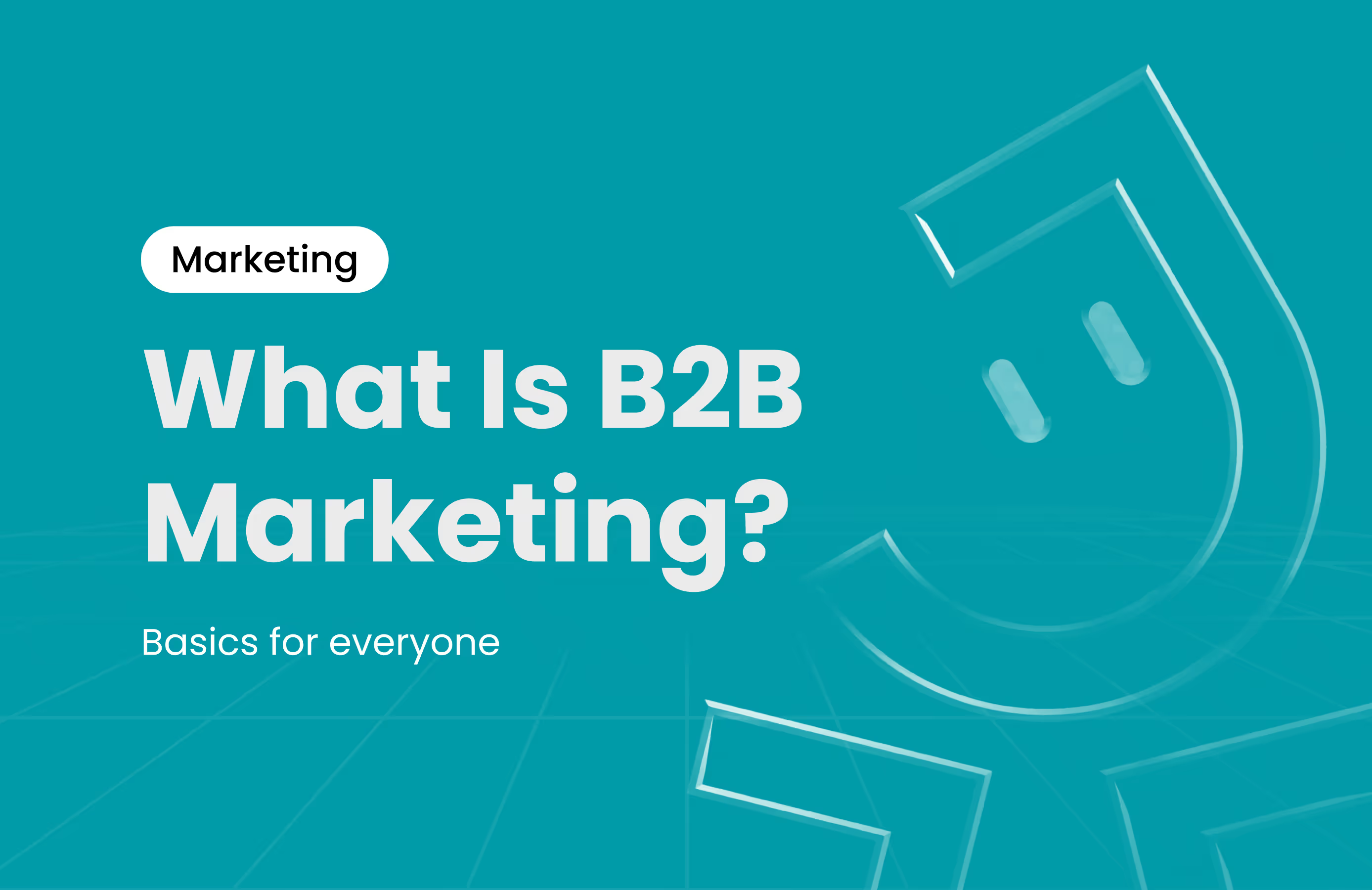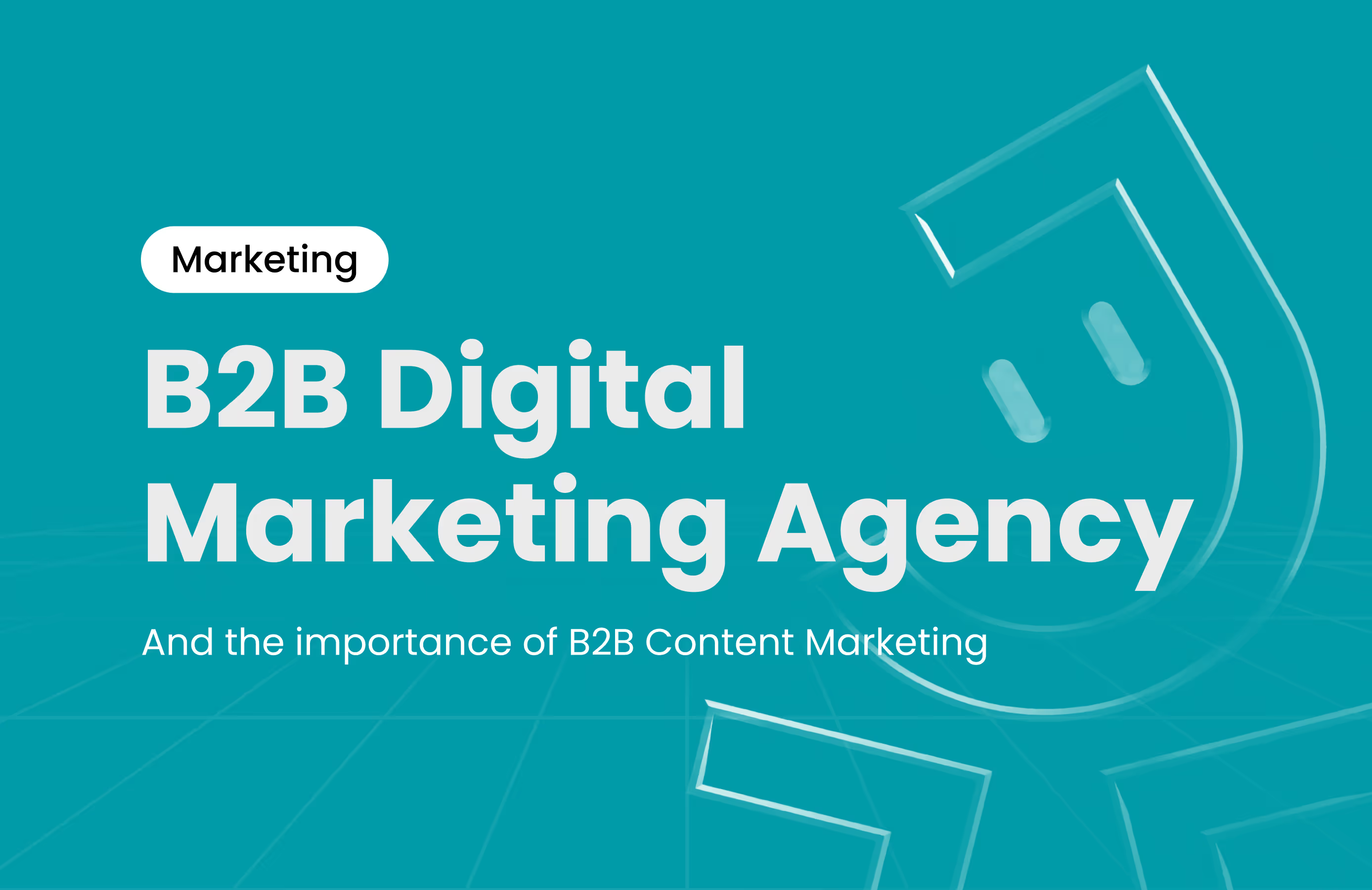What is B2B Marketing? Definition, Trends, Insights & Quick Actions for 2026

Not just for marketers, understanding B2B marketing definition is essential for every company that sells to other businesses. It defines how organizations connect, communicate, and build long-term relationships that drive measurable growth.
Whether your company provides SaaS software, industrial machinery, or consulting services, mastering B2B Marketing Basics determines how effectively you attract decision-makers, nurture leads, and close high-value deals.
This guide from Journeyhorizon explains everything you need to know, from the definition and strategy structure to current trends, real-world examples, and a practical checklist to help you apply these insights immediately.
And if you need a premium partner to improve your brand visibility, explore here: Journeyhorizon marketing services!
What is B2B marketing?
B2B Marketing Definition
B2B marketing (short for business-to-business marketing) is the process in which one company promotes or sells its products and services to another company. Instead of targeting individual consumers, B2B marketing focuses on corporate buyers, procurement departments, and professional decision-makers.
Unlike B2C (business-to-consumer) marketing, where emotional appeal often drives purchasing decisions, B2B marketing depends on logic, trust, and clearly demonstrated business value.
B2B Marketing Basics
To compare B2B marketing vs other business model marketing, we need to understand some core principles.

Key characteristics of B2B marketing:
- The target audience is smaller, but each transaction usually has a higher value.
- The buying process is longer and involves multiple stakeholders.
- Building long-term relationships is more important than one-time sales.
- ROI, performance, and efficiency are top priorities.
Understanding these B2B Marketing Basics helps you establish a solid foundation before creating any marketing plan. It clarifies who your audience is, how they make decisions, and what kind of information influences them most.
Core Components of a Successful B2B Marketing Strategy
An effective B2B marketing strategy combines several essential elements to attract, engage, and convert potential business customers.
1. Define Your Buyer Persona
Identify your ideal client profile. Determine the industry, company size, challenges, and decision-makers involved. For example, a SaaS company may target “IT directors in mid-sized enterprises managing hybrid teams.”
2. Map the Buyer’s Journey
In the B2B world, purchasing decisions usually follow three stages:
- Awareness - recognizing a business problem or opportunity.
- Consideration - researching and evaluating potential solutions.
- Decision - selecting a vendor and making a purchase.
Your marketing should provide relevant content for each stage, such as blog articles for awareness, comparison guides for consideration, and ROI case studies for decision.
3. Select the Right Marketing Channels
B2B content marketing usually generates blogs, whitepapers, reports, videos, and webinars that position your brand as an authority. But where to distribute them?
Popular B2B marketing channels include:
- Email marketing: nurturing leads and maintaining client relationships.
- LinkedIn marketing: connecting with professionals and building thought leadership.
- Account-Based Marketing (ABM): personalized outreach to high-value accounts.
4. Craft a Strong Value Proposition
Your message must clearly state how your solution improves results for clients. Replace generic claims like “Our platform is innovative” with specific outcomes such as “Our platform helps reduce project delays by 30% through real-time collaboration.”
5. Measure and Optimize Results
Successful B2B marketers track lead quality, conversion rates, customer lifetime value, and sales cycle duration. Regular data analysis allows you to refine campaigns and maximize ROI.
Many companies also use CRM platforms like HubSpot or Salesforce to track lead quality, manage accounts, and analyze campaign performance. Integrating these systems supports better collaboration between sales and marketing teams.
For marketplaces or SaaS platforms, integrating SEO optimization for B2B marketplace techniques can significantly boost visibility and attract high-intent buyers.
Latest Trends in B2B Marketing (2026 and Beyond)
When people ask “what is B2B marketing” today, the answer reflects a major shift in how businesses discover, evaluate, and purchase solutions. Digital transformation, AI, and data analytics are redefining the entire landscape.
Here are the top trends shaping B2B marketing in 2026:
- Digital-first engagement: Most B2B buyers research online before contacting sales teams. A strong digital presence and high-quality content are essential.
- Artificial intelligence and personalization: AI enables marketers to personalize experiences at scale, improving lead conversion and retention.
- Data-driven strategy: Businesses increasingly rely on analytics tools and CRM systems to make objective marketing decisions.
- Account-Based Marketing (ABM): Personalized outreach focused on key accounts delivers higher ROI than broad campaigns.
- Relationship-centric growth: Long-term partnerships and post-purchase experiences are replacing short-term sales tactics.
Emerging technologies such as predictive analytics, conversational AI, and marketing automation are reshaping how businesses generate leads and personalize outreach. Integrating these tools helps marketers forecast buying intent and deliver hyper-relevant experiences to decision-makers.
In short, according to the latest research from the Content Marketing Institute, B2B marketing in 2026 blends technology, data, and human insight to build relationships that last and generate measurable growth.
Journeyhorizon - Your trusted partner in B2B Marketing
Now that you understand the fundamentals, let’s look at how leading experts help businesses implement them effectively.
For over seven years of building and scaling, Journeyhorizon has been a trusted partner in marketing strategy and implementation for international B2B businesses and marketplaces.
We help organizations transform their marketing approach by combining data, creativity, and proven digital systems to drive sustainable growth.
Our Expertise in B2B Marketing Services include:
- B2B Marketplace Development
We specialize in building scalable and high-performance marketplaces using Sharetribe, Webflow and other modern technologies. Whether you aim to create a niche B2B platform or replatform an existing marketplace, we ensure a smooth and conversion-focused user experience. - SEO Optimization for B2B
Our SEO team helps B2B companies achieve visibility where it matters most. From keyword strategy to technical SEO, content architecture, and link building, we focus on attracting qualified leads and turning organic traffic into measurable revenue. - Digital Marketing Services
Journeyhorizon provides a full suite of digital marketing solutions designed for complex B2B ecosystems. Our campaigns integrate content strategy, paid advertising, automation, and analytics to deliver data-driven results across every channel. - And more…
Explore our full-stack marketing services here!
Through a blend of strategic insight and practical execution, Journeyhorizon empowers brands to build credibility, reach decision-makers, and accelerate growth in competitive industries.
B2B Marketing Basics: Quick Action Checklist
Use this six-step checklist to put your B2B marketing strategy into action:
- Define your target audience and the key decision-makers.
- Map their buyer journey with clear touchpoints.
- Choose two or three main marketing channels suited to your audience.
- Develop a compelling value proposition with measurable results.
- Track important metrics such as lead quality, conversion rate, and ROI.
- Optimize continuously through data analysis and A/B testing.
Common mistakes to avoid:
- Targeting too broad an audience and wasting budget.
- Neglecting lead nurturing and post-purchase communication.
- Misalignment between marketing and sales teams.
- Focusing on vanity metrics instead of revenue impact.
Following this checklist turns the B2B Marketing Definition into real-world execution and consistent improvement.
Frequently Asked Questions (FAQ)
1. What is B2B marketing in simple terms?
B2B marketing means promoting products or services from one business to another. Instead of targeting consumers, it focuses on building trust and long-term partnerships with organizations or corporate buyers.
2. How is B2B marketing different from B2C marketing?
The main difference lies in the audience and buying process. B2B marketing targets businesses with longer decision cycles, multiple stakeholders, and logical value-driven messages. B2C marketing focuses on individuals and uses emotional or impulse-based communication.
3. What are the main components of a B2B marketing strategy?
A complete B2B strategy includes clear buyer personas, mapped buyer journeys, multi-channel outreach, data-driven measurement, and ongoing optimization. Many businesses also apply SEO optimization techniques to boost online visibility.
4. Why is B2B marketing important in 2026?
Modern B2B marketing is critical because of digital transformation, AI, and more demanding corporate clients. Businesses that understand data, personalization, and automation can build stronger relationships and outperform competitors in complex markets.
5. How can I start improving my B2B marketing today?
Begin by defining your ideal business customers, mapping their journey, and focusing on high-impact channels such as content marketing and LinkedIn.
Conclusion and Next Steps
You now have a clear answer to “What is B2B marketing” and the insights to apply it effectively.
At Journeyhorizon, we have helped global B2B brands increase organic visibility, improve lead quality, and scale revenue through data-driven marketing systems.
Ready to build your growth engine?
Contact our team today to discuss your strategy or a customized roadmap.



